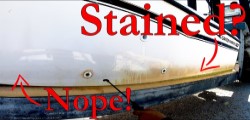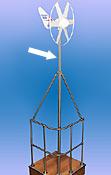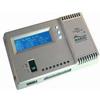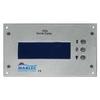Wind Power: To decrease your "boating footprint", why not
start harnessing wind power to produce electricity?
In theory, large windmills generate huge amounts of electricity for municipalities. With blades of more than 100 feet in length, these generators can be cost effective.
However, on a smaller scale, most recreational boaters are less likely to produce vast amounts of electricity in this way. First of all, boats sit at sea level. At sea, they spend half their time in the troughs of waves, and when at dock, other boats block most of the wind. Second of all, the wind isn't always willing to cooperate unless you are fortunate enough to live in a region of trade winds.
That said, in certain regions, the wind blows relentlessly day and night at ideal velocities. Why not take advantage of it?!
Wind power is a great supplement to using solar power. A beautiful coincidence is that the wind can often blow when solar panels are less effective - during storms, at night, in the winter - and they take up vertical space, rather than horizontal space.
How does it work?
Wind turns a turbine which convert this kinetic energy into electricity. Wind turbines range in size from the ability to produce 1 watt to over 500 watts.
Concerns with Wind Power:
Noise
Wind generators can be quite noisy. In our experience, the generators with short, narrow blades tend to make a "whizzzzz" sounds at high speeds. This is often caused by turbulance from the blades themselves, or the bearings inside the generator. Some seem to make more noise during times of acceleration. Larger and wider blades tend to move slower and therefore less noise. They accelerate slower so may create less noise. Larger blades tend to be more powerful, but tend to underperform during low winds.
Noise is completely subjective - some people are more sensitive than others, so it's best to do research on which models will be tolerated by your crew and neighbours!
Placement
It is a good idea to put plenty of thought to where you will mount a wind turbine. Atop a mizzen mast is quite popular - the higher it is, the quieter and more effective it will be. Plus, there's no need for a mounting pole on your deck. However, they are tough to access for maintenance, especially if you need to dismount it in a unsafe situation.
Wind turbines are quite effective at their wind range of usually 10-15 knots.
Overcharging
Use a charge controller to protect your batteries from overcharge.
Conclusion:
For weekend warriors, wind power may not be worthwhile. However, wind power can be a desirable way to generate electricity in one or more of the following situations:
- Your boat lies more than 40 metres from others (or your wind generator is quiet most of the time)
- You often have access to undisturbed breeze
- You live at latitudes where solar power is less practical
- You spend multiple days at sea


















